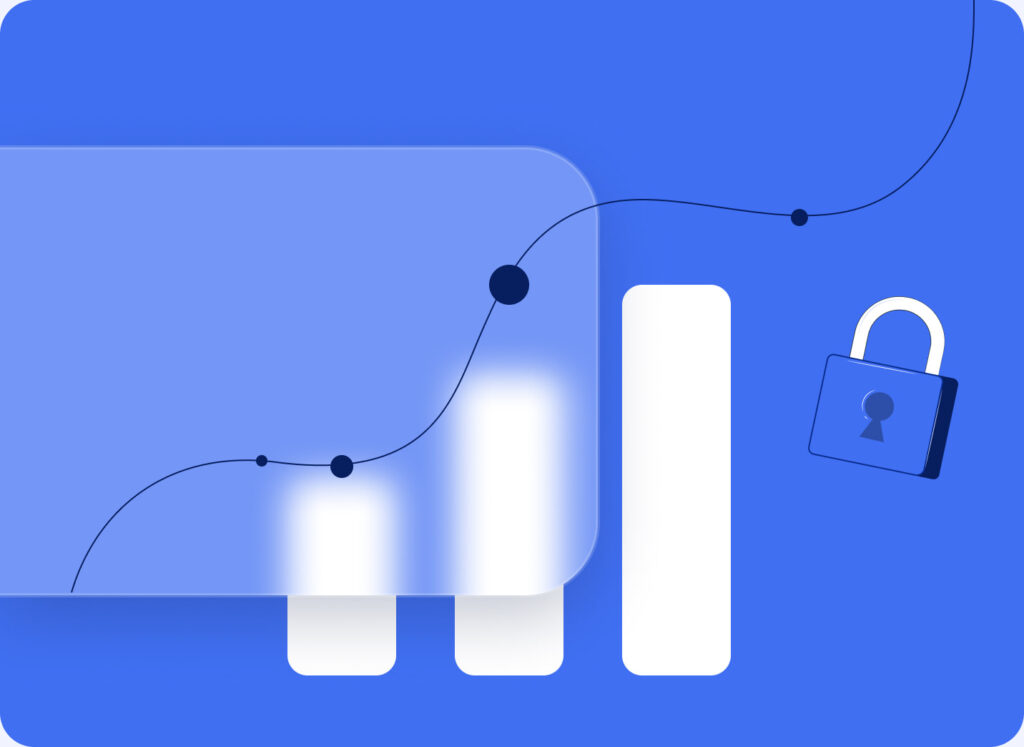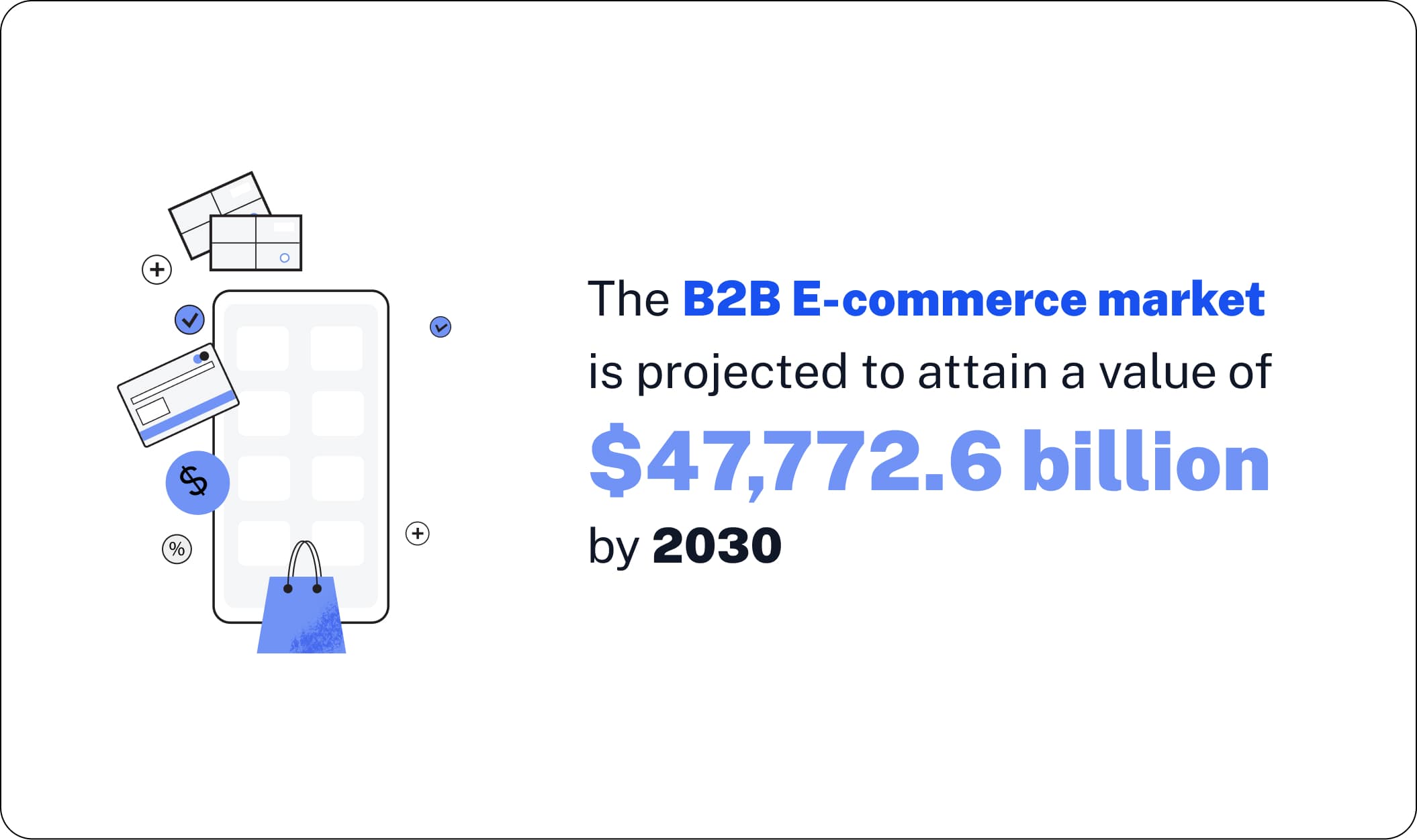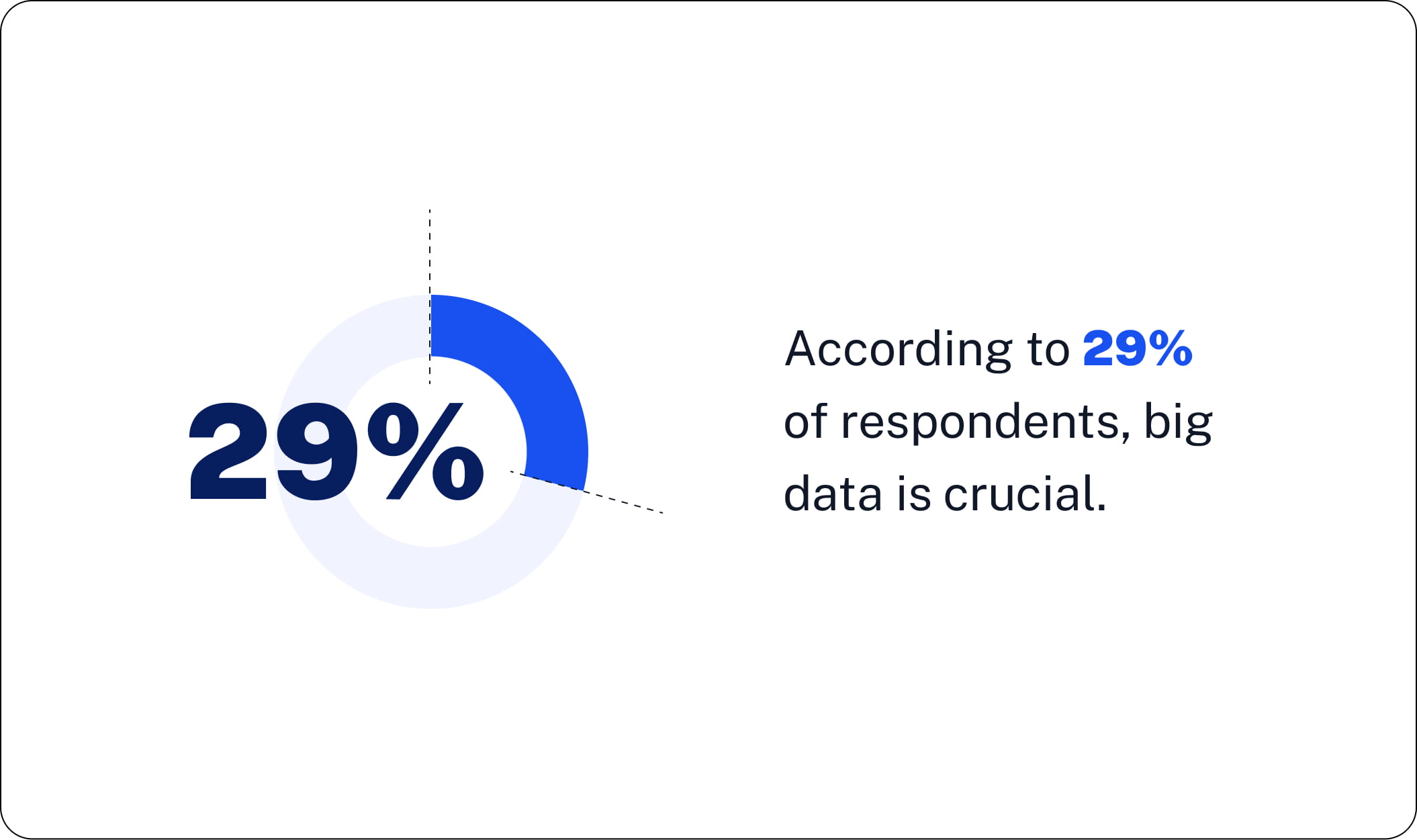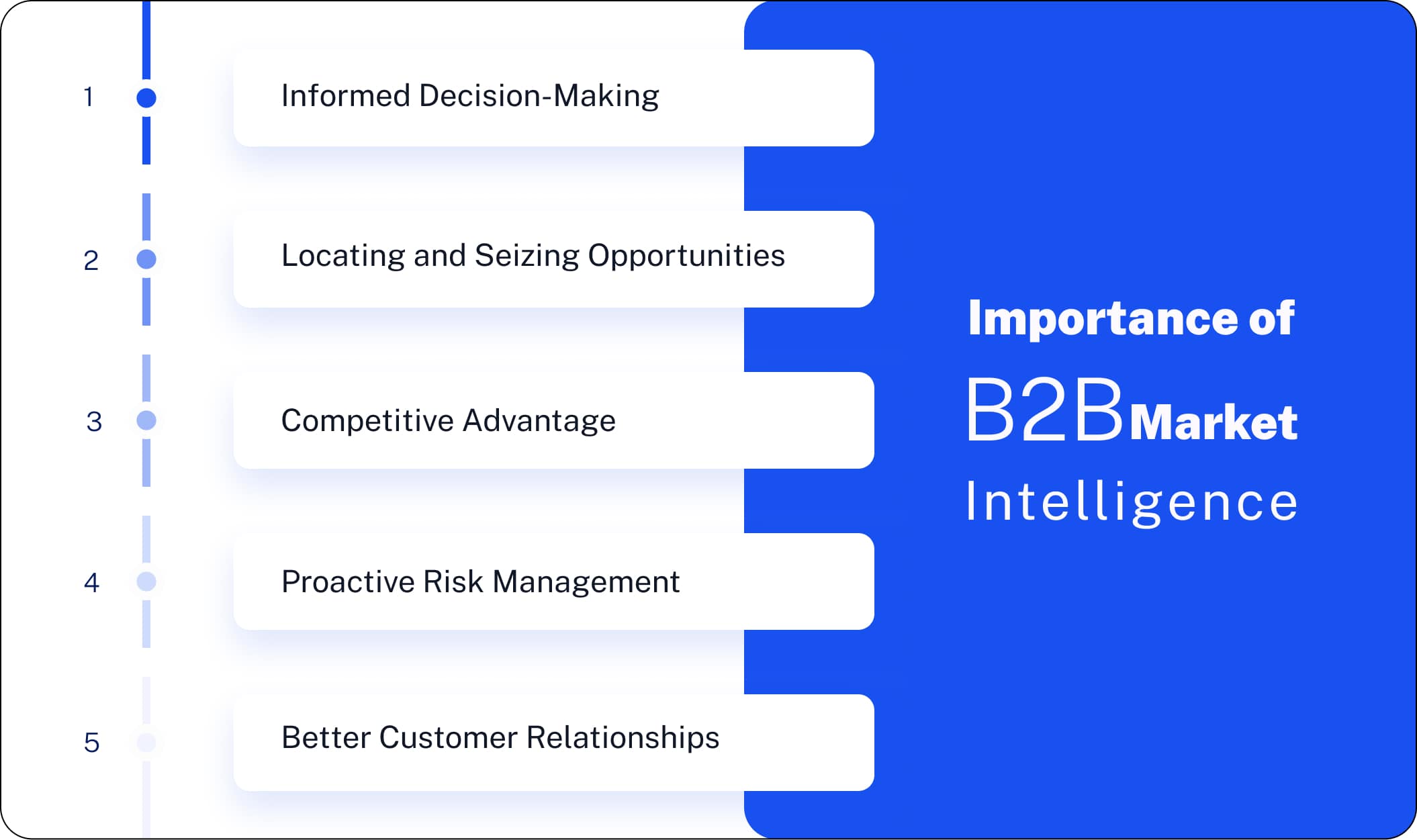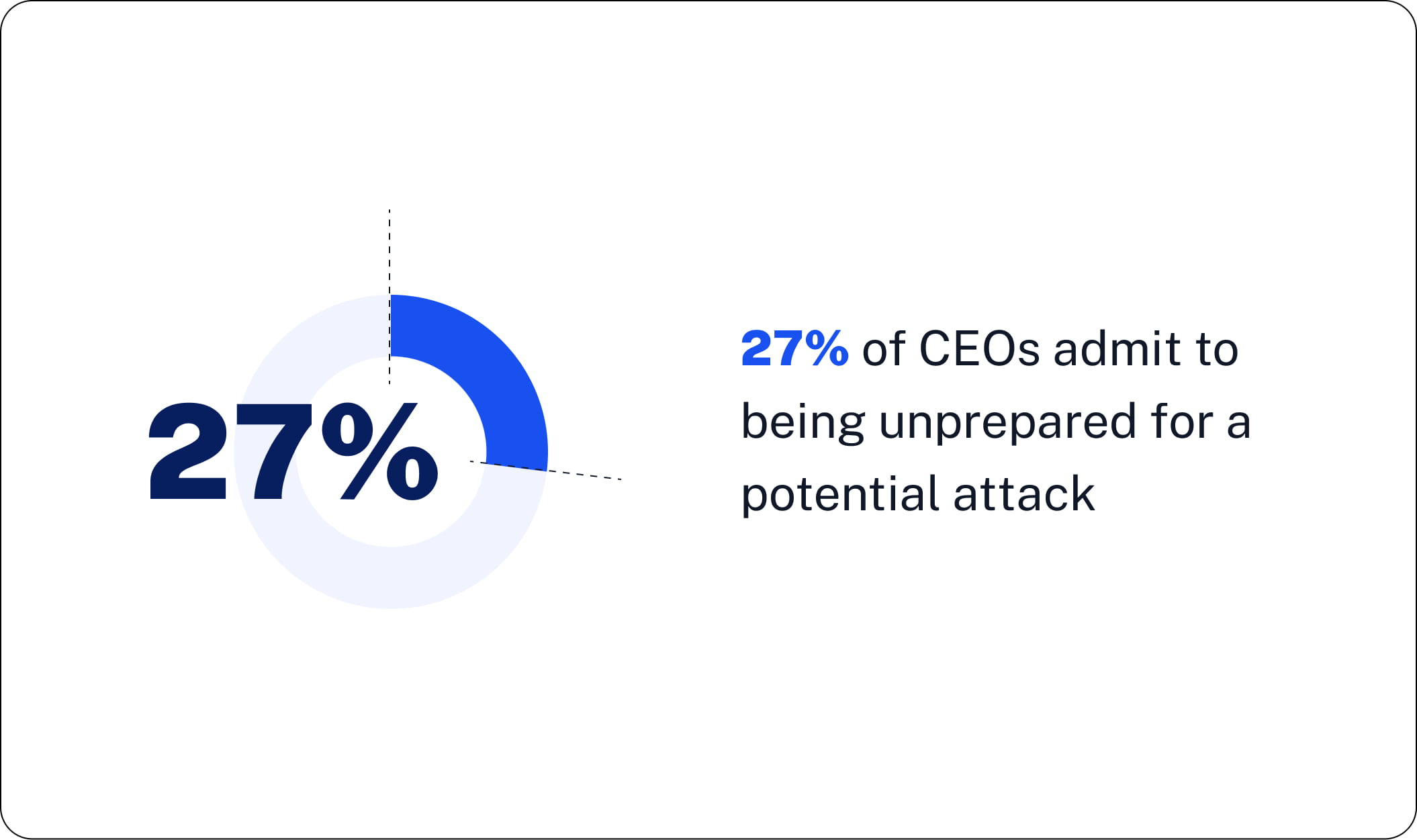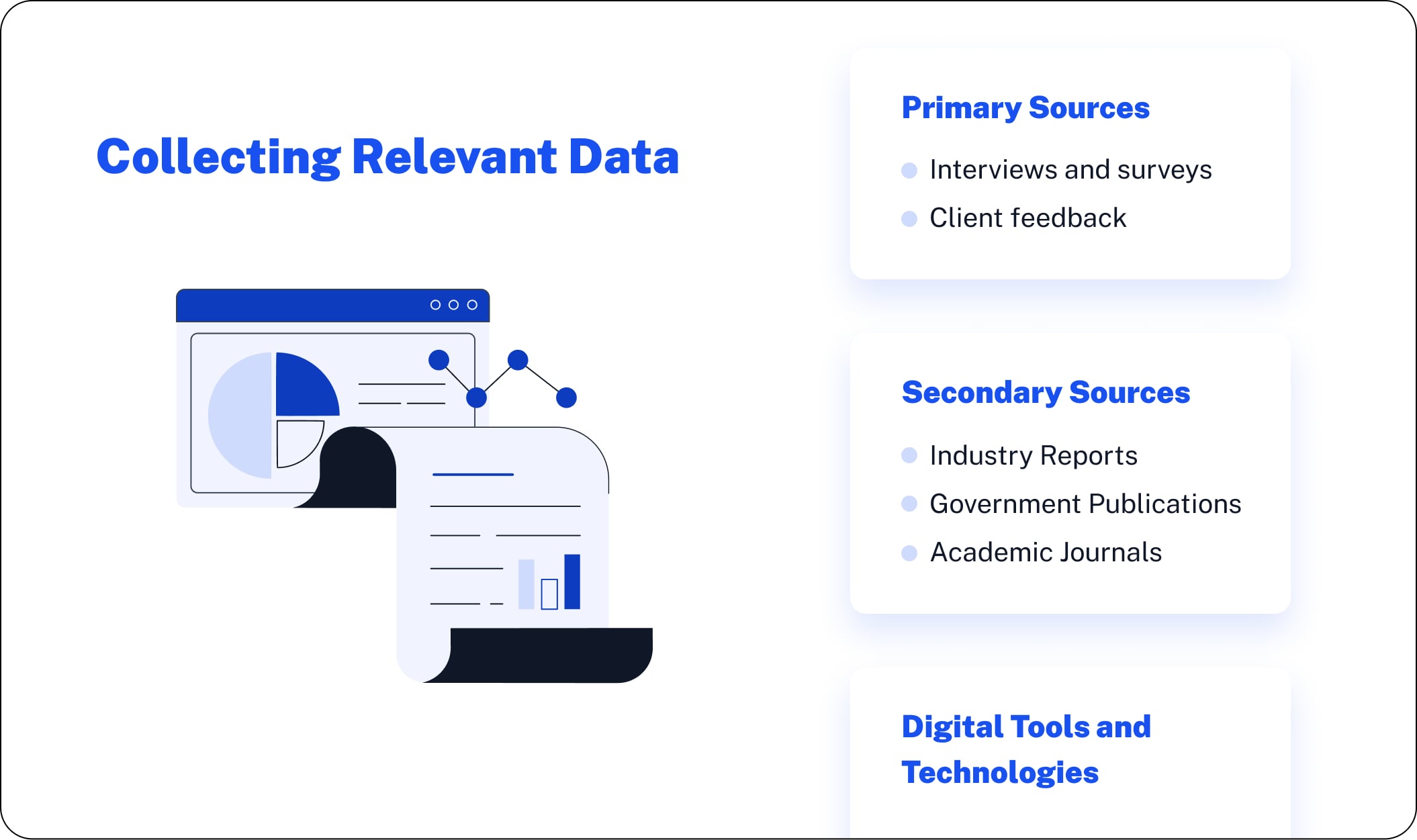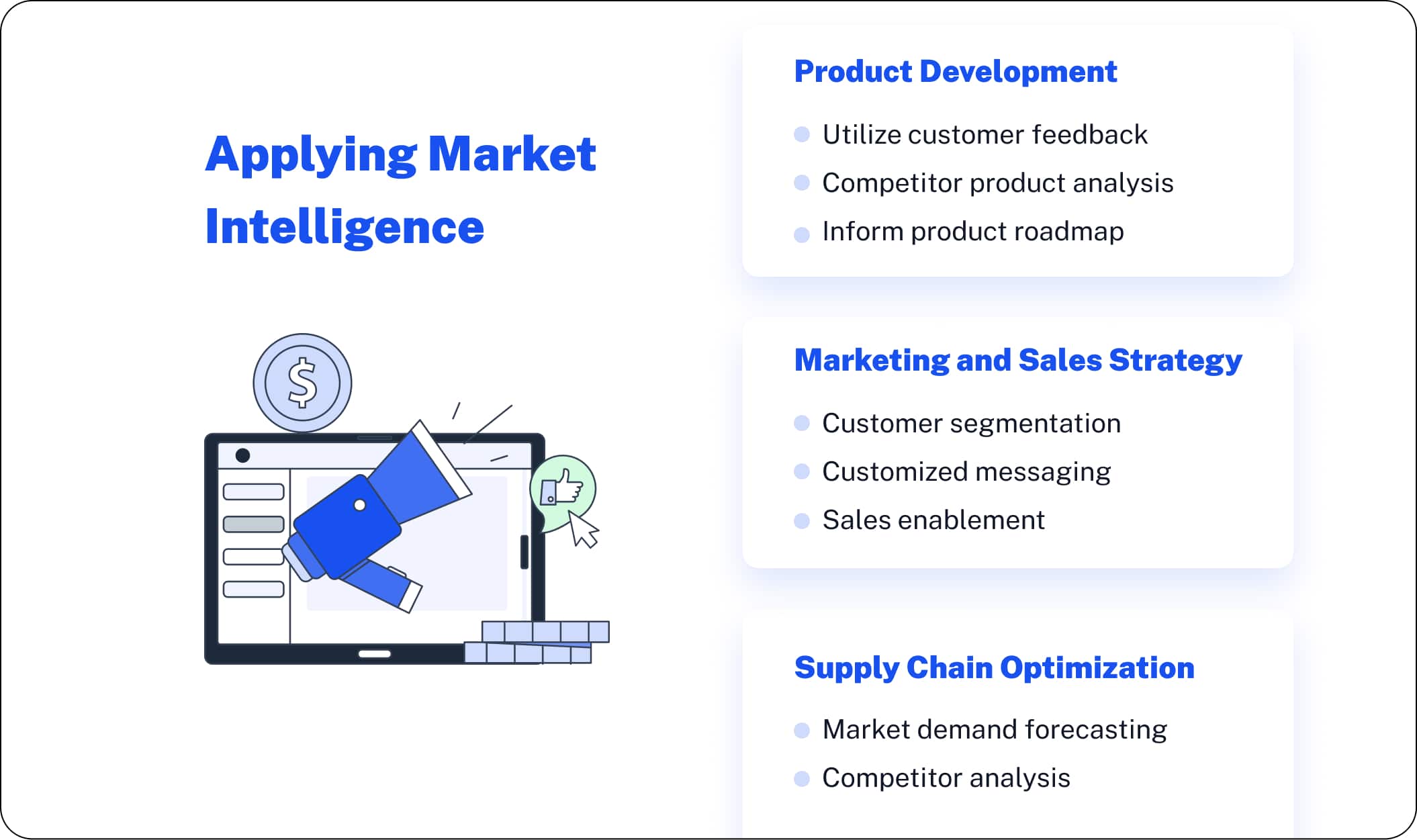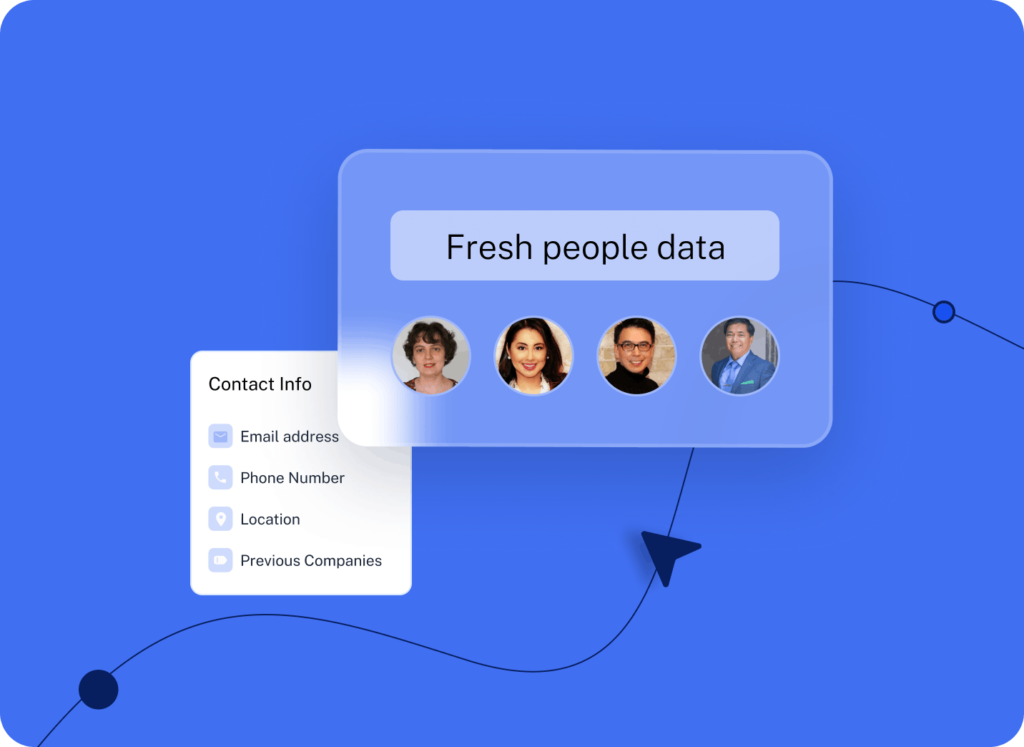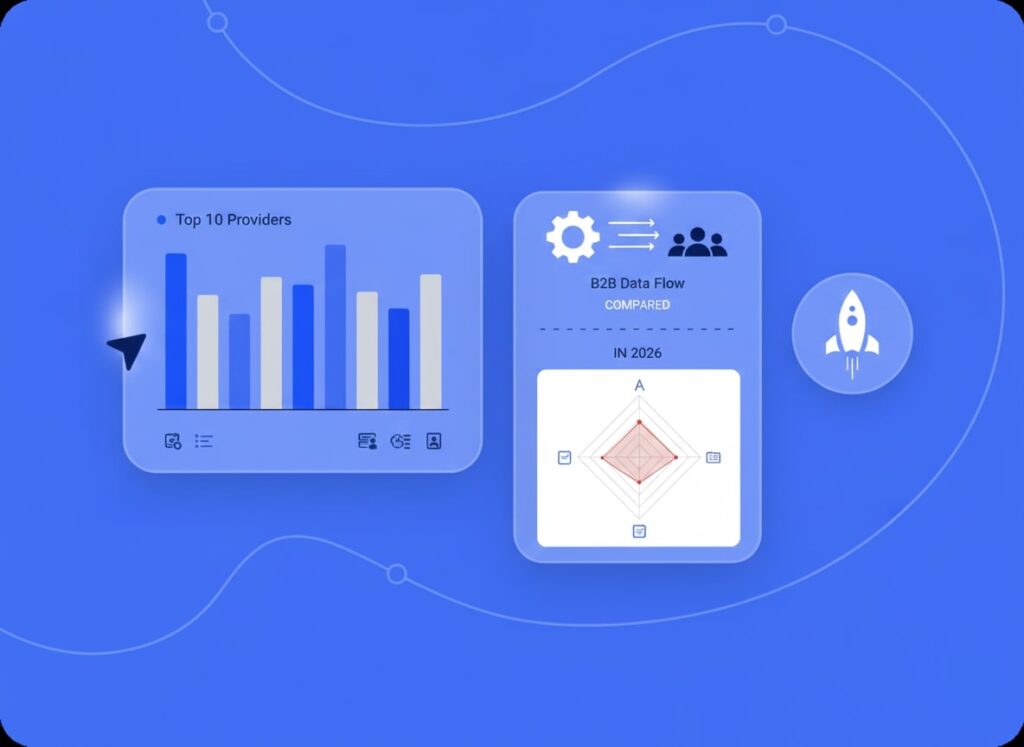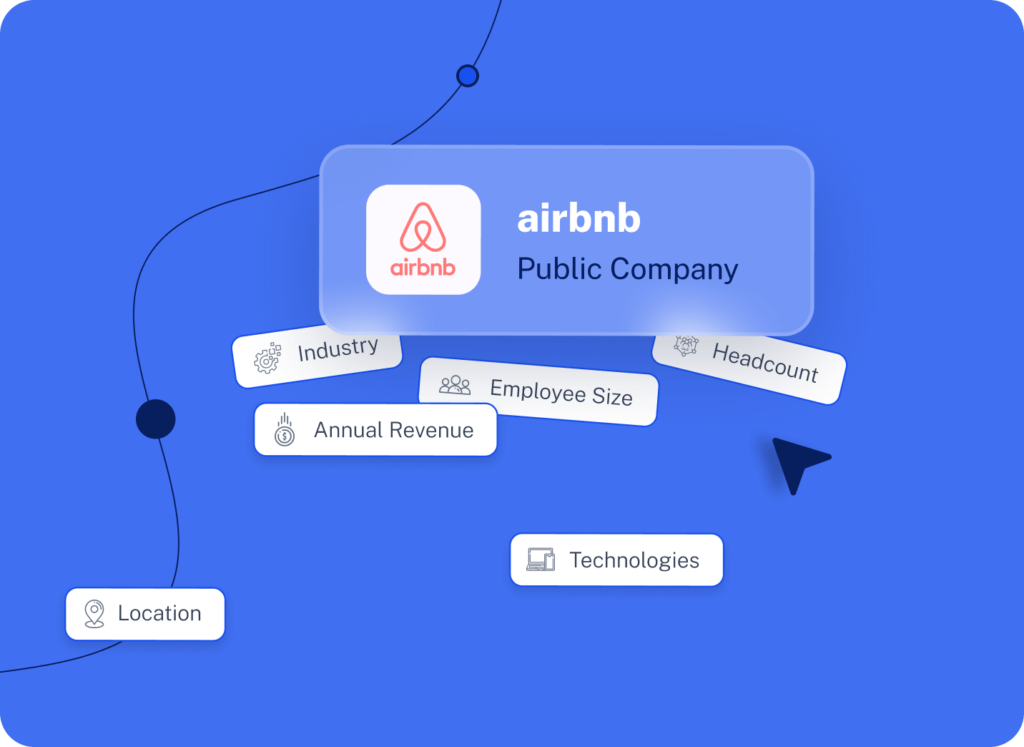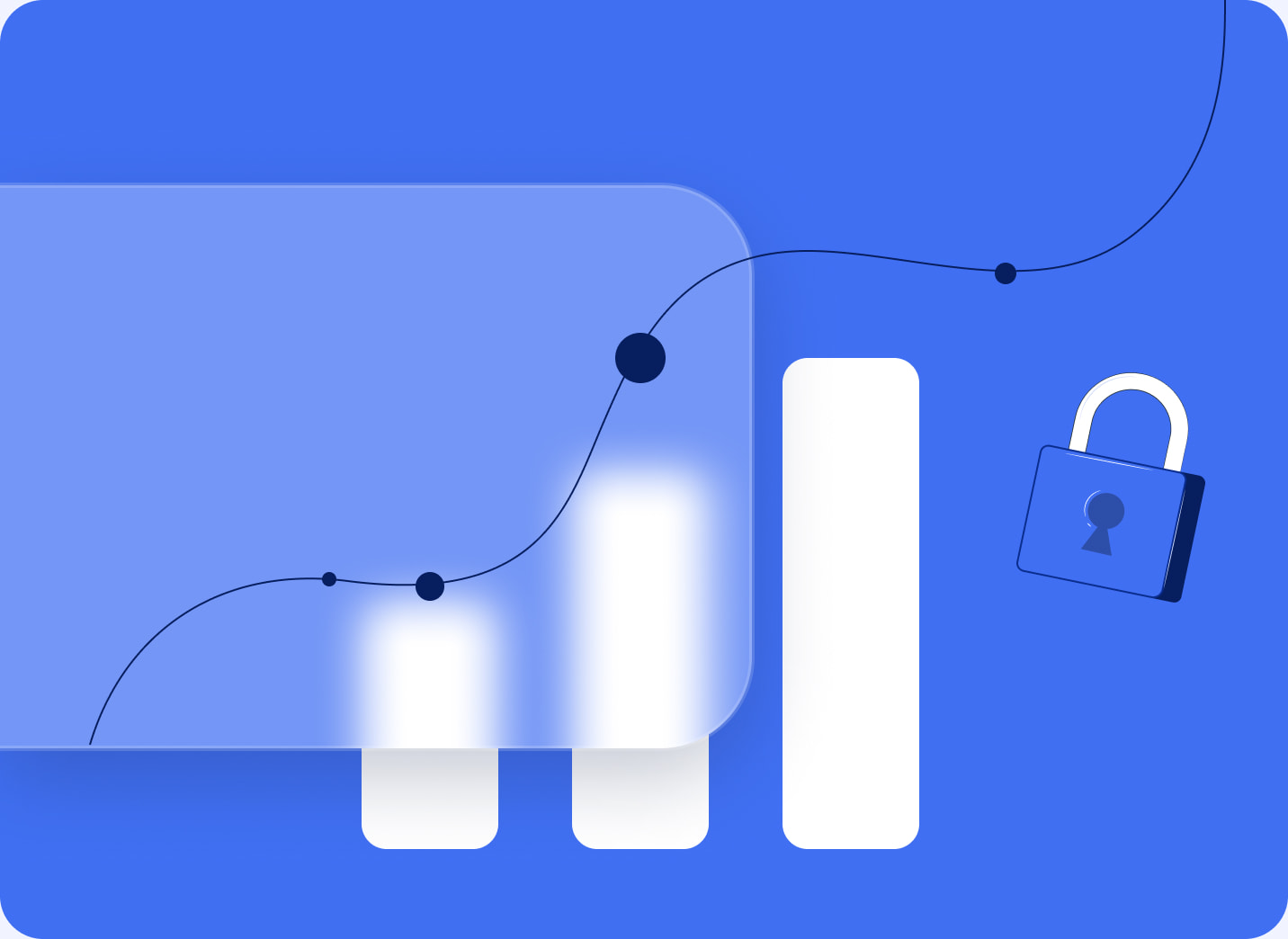Know what your customers want before they do.
You know how fulfilling and how much benefit achieving the above for your company.
But how? Where to start?
Knowing your market and consumers’ wants is crucial in today’s competitive business environment. Business-to-business (B2B) market intelligence helps businesses customize their offers, influencing consumer choices and propelling corporate success.
Companies that use data-driven tactics see revenue growth of 20% on average. This clarifies the significance of B2B market intelligence for modern businesses.
Every contemporary business gathers intelligent data about its customers, competitors, market opportunities, and industry trends; B2B Market Intelligence helps them interpret this data and develop competitive strategies. This gives them a greater understanding of their customers and a significant edge over their rivals.
This blog explains what B2B marketing intelligence is and how to use it effectively.
What is B2B Market Intelligence?
B2B market intelligence is the process of gathering and analyzing data about the B2B market to gain significant insights into market dynamics, competitor activity, industry trends, and customer behavior.
With the B2B e-commerce sector expected to reach a valuation of $47,772.6 billion by 2030, companies should utilize data to identify potential possibilities, stay competitive in their specific markets, and make educated decisions.
To produce pertinent and helpful insights, B2B market intelligence requires compiling information from various sources, such as trade publications, government databases, market research studies, and customer feedback. Then, the data is examined and evaluated.
Different Types of Data in B2B Market Intelligence
Different businesses may require different kinds of B2B market intelligence.
Although these are the main types of B2B marketing intelligence data, you can also gather other types through supplier data, partner collaboration, industry events and associations, and other means.
Here, we examine some of the most prevalent and useful data.
Primary Research Data
Data from surveys and interviews that are directly obtained are categorized as preliminary research data. Participants in these surveys or interviews may include B2B clients, vendors, or industry stakeholders. They can be made to understand better their clients’ preferences, pain spots, and purchasing habits.
Secondary Research Data
This information is presented through market analyses, industry-specific reports, and research studies. These are typically produced by specialized market research companies or, occasionally, by government agencies to understand potential opportunities better and forecast new market trends.
Publicly Available Data
This includes data from published sources such as government databases, industry-specific publications, and corporate websites.
Competitive Intelligence
Competition analysis yields competitive intelligence. It provides insight into your rivals’ tactics, activities, strengths, and weaknesses. Enterprises seeking to outperform their rivals can profit from this information.
Big Data Analytics and Other Technological Analysis
According to 29% of business professionals, big data is crucial.
Why?
This data aids in understanding consumer attitudes, patterns, or any correlation that may support a company’s strategic decision-making.
The methods used to collect this data are web scraping, social media monitoring, big data analytics, websites, social media platforms, and online forums.
Customer Feedback and Support Data
Businesses need to use customer support data, which is a goldmine of information, to identify process flaws, customer pain points, and possible areas for improvement.
Importance of B2B Market Intelligence
Operating based only on intuition and gut feelings is insufficient in today’s competitive B2B market. Companies need to be more nimble and better grasp the ever-changing market dynamics.
B2B market intelligence might serve as your strategic compass in this situation.
The following justifies the indispensability of B2B market information for any company aiming for long-term success:
Informed Decision-Making
Picture yourself stumbling through a thick fog. That’s how B2B decision-making might seem in the absence of market intelligence. Market information serves as an effective searchlight, shedding light on consumer demands, rival tactics, and new developments in the sector.
With this information, you may make wise decisions about resource allocation, pricing schemes, marketing efforts, and product development. Market intelligence enables you to make well-considered decisions that are more likely to succeed so you can stop flying blind.
Locating and Seizing Opportunities
The B2B sector is a vibrant environment full of opportunity. Market intelligence can help you recognize these opportunities ahead of your rivals. By examining consumer feedback and market trends, you may predict future requirements and create creative solutions that satisfy them.
For example, when a growing market sector with unmet demands is identified early on, you can adjust your products and take a substantial market share before competitors catch up.
Competitive Advantage
Success in the congested B2B market depends on distinction. Market information can help you better comprehend your rivals’ advantages and disadvantages. By examining their offerings, advertising approaches, and price structures, you can determine areas where you can outperform them.
With this information, you may differentiate yourself from the competition by improving your approach and creating a special competitive advantage.
Proactive Risk Management
Dangers are present everywhere in the B2B industry. Market information can help you foresee and reduce dangers. By observing rival activity and industry trends, you can detect impending disruptions such as new laws, technological advances, or economic downturns.
It is worrisome that 27% of the CEOs acknowledge that they are unprepared for a possible attack. However, with market intelligence, you can avoid this. Because of your foresight, you may create backup plans and modify your tactics to lessen the impact of these dangers.
Better Customer Relationships
A strong customer relationship is the foundation of B2B success. Market information can help you gain a deeper understanding of your customers. By examining their online behavior, purchase trends, and comments, you may learn much about their requirements, preferences, and sore spots.
With this information, you can better target your product offerings, create more personalized marketing campaigns, and deliver top-notch customer support—all of which can help you build longer-lasting and more lucrative connections with your clients.
In summary, B2B market intelligence is a strategic necessity rather than a “nice to have.” It creates proactive risk management, empowers informed decision-making, and opens the door for long-term, steady company growth.
How to Use Market Intelligence Effectively
Access to market intelligence is crucial for making educated B2B decisions. However, how might unprocessed data be transformed into useful insights?
Here’s a thorough guide:
Identifying Business Goals
Establishing your business objectives is essential before you start collecting data.
Do you want to enter a new market or expand your current one? Are you getting ready to launch a new product? Are you in search of a competitive edge? By coordinating your market intelligence endeavors with particular goals, you can be sure to collect the most pertinent data.
If your objective is to expand your market, you should prioritize information on consumer patterns, the presence of competitors, and the regulatory landscape in the intended area.
This alignment guarantees that the information obtained immediately aids in accomplishing the company’s main goals and streamlining the decision-making process.
Collecting Relevant Data
Combining primary and secondary sources is necessary to create a solid data set:
Primary Sources
An in-depth understanding of consumer demands and market dynamics can be gained through primary data-gathering techniques like:
- Interviews and surveys: To learn about the wants, problems, and purchasing habits of both present and potential consumers, conduct interviews and surveys with them. The interviews of key stakeholders and industry experts can offer information about market trends and opportunities.
- Client feedback: Examine customer reviews, social media mentions, and support tickets to understand better client sentiment and areas where your products or services could be improved.
These techniques enable businesses to obtain firsthand data that is extremely pertinent to and targeted toward their goals.
Secondary Sources
Secondary data sources can provide a wider context. They offer insightful trend analysis and benchmarks useful for making strategic decisions.
Below are some secondary sources that you can use:
- Industry Reports: Consult industry reports and publications from reliable research companies to thoroughly grasp the market’s size, growth prospects, and major trends.
- Government Publications: Government websites frequently provide insightful information on economic statistics, demographic trends, and industry rules.
- Academic Journals: Research papers and academic journals can provide in-depth analyses of market trends and new technological developments that may influence your company.
Digital Tools and Technologies
Do you know that Statista projects that the average spending per employee in the business intelligence software industry will be $7.80 in 2024?
That is how vital digital tools and technologies are in today’s business.
Effective data collection and analysis depend on utilizing advanced software and web platforms in the digital world.
AI Ark and other contemporary AI-powered platforms can simplify data collection and processing. These tools can assist you in gathering and examining enormous volumes of online data from various sources and rival platforms.
Analyzing the Data
Examining gathered data is an essential step in market intelligence. This process involves sorting the data to find trends, patterns, and useful insights. The objective is to convert unstructured data into insightful knowledge to guide strategic choices.
The focus should always be on obtaining useful, implementable insights that support the company’s strategic objectives.
Here’s how to develop insights that can be put to use:
- Cleaning and Organizing: Verify that your data is free of mistakes or discrepancies.
- Identify Patterns: Examine the data for patterns, relationships, and outliers. Tools for data visualization might be useful in spotting patterns.
- Ask the Correct Questions: Don’t limit your analysis to what the data indicates; pose inquiries that cast doubt on presumptions and reveal untapped potential. For instance, client feedback that expresses dissatisfaction with a certain feature may point to a potential avenue for product improvement.
Applying Market Intelligence
Transformed data in several business domains facilitate informed decision-making:
Product Development
By following the process below, businesses can improve existing products or create new items that more effectively satisfy market demands.
- Utilize customer feedback: Examine consumer feedback to identify issues and unfulfilled demands.
- Competitor product analysis: Determine the advantages and disadvantages of your competitors to improve your product line.
- Inform product roadmap: Prioritize features and functionalities for product development based on market research.
Marketing and Sales Strategy
A BI tool is already a vital component of the business plan of more than 46% of companies. This is because businesses can better target their marketing efforts and sales techniques to their target audience.
If you want to boost your sales, you can prioritize the below:
- Customer segmentation: Create highly focused and individualized marketing initiatives using data to segment your target population.
- Customized messaging: Create appealing communications to particular client segments according to their tastes and purchasing patterns.
- Sales enablement: Enable your sales force to effectively contact new customers and close deals by providing them with relevant market knowledge.
Supply Chain Optimization
Businesses can modify their supply chain operations to match current market demands and competitive strategies better using insights from market intelligence.
- Market demand forecasting: Project future demand based on market trends to maximize inventory management and prevent stockouts.
- Competitor analysis: Analyze competitors’ supply chains to determine possible disruptions and gain insight into their tactics. This will keep you ahead of the competition and enable you to create backup plans.
Monitoring Market Trends
The market is always changing. It’s critical to monitor developments by gathering and analyzing data continuously. This lets you stay ahead of the market curve and quickly modify your plans.
Use market intelligence tools and a proactive approach that allows you to modify your tactics in reaction to new trends, technological developments, and changes in consumer behavior.
Measuring the Impact
Assessing the results of market intelligence initiatives is essential to determining their efficacy. Establish quantifiable KPIs closely related to your initial company objectives to measure the effectiveness of your market intelligence efforts.
These might consist of:
- Sales growth: Monitor sales data to determine whether your tactics based on market knowledge are working.
- Market penetration rates: Monitor market share in your target segments.
- Customer satisfaction scores: Measure consumer satisfaction using surveys and reviews to determine whether the changes you made based on market research are accepted. A study states that 92% of customers trust referrals from friends and family, emphasizing the impact of customer satisfaction on a company’s reputation.
- New customer acquisitions: Keep track of the quantity of new clients your market intelligence-driven sales and marketing tactics have brought in.
These measurements give companies concrete proof of the benefits of their market intelligence efforts, enabling them to improve their approach and achieve even greater success.
Overcoming Obstacles
Even while market intelligence is incredibly valuable, companies frequently run the risk of depending on out-of-date information.
Below are a few typical obstacles:
- Data Overload: There can be an excessive amount of data available.
- Analysis Paralysis: Decision-making delays may result from analysis paralysis, which is the pressure to examine every data point.
- Outdated Information: Information can easily become outdated, producing false conclusions.
To solve these problems, tools such as AI Ark streamline the data analysis process and guarantee that the insights obtained are pertinent and up to date. By overcoming these obstacles, businesses can fully utilize market intelligence to support strategic growth and well-informed decision-making.
AI ARK Your B2B Market Intelligence Tool
B2B market intelligence has a bright future, and AI-powered products like AI Ark set the standard.
Utilizing AI’s powers for automated lead generation, fresh data, and data filtering, AI Ark assists companies in overcoming the drawbacks of conventional techniques and deriving even more profound insights from their data.
This results in quicker and better-informed decision-making, enabling you to seize momentous chances and confidently traverse the constantly shifting B2B landscape.
Contact us today to get started with your market intelligence journey.



